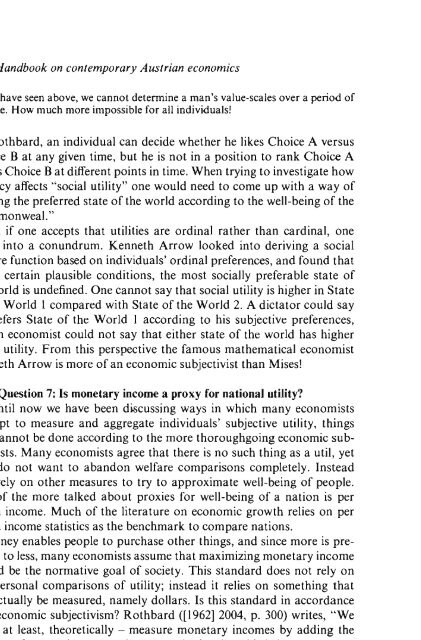Handbook on Contemporary Austrian Economics
Handbook on Contemporary Austrian Economics
Handbook on Contemporary Austrian Economics
You also want an ePaper? Increase the reach of your titles
YUMPU automatically turns print PDFs into web optimized ePapers that Google loves.
54 <str<strong>on</strong>g>Handbook</str<strong>on</strong>g> <strong>on</strong> c<strong>on</strong>temporary <strong>Austrian</strong> ec<strong>on</strong>omics<br />
we have seen above, we cannot determine a man's value-scales over a period of<br />
time. How much more impossible for all individuals!<br />
To Rothbard, an individual can decide whether he likes Choice A versus<br />
Choice B at any given time, but he is not in a positi<strong>on</strong> to rank Choice A<br />
versus Choice B at different points in time. When trying to investigate how<br />
a policy affects "social utility" <strong>on</strong>e would need to come up with a way of<br />
ranking the preferred state of the world according to the well-being of the<br />
"comm<strong>on</strong>weal. "<br />
But if <strong>on</strong>e accepts that utilities are ordinal rather than cardinal, <strong>on</strong>e<br />
is led into a c<strong>on</strong>undrum. Kenneth Arrow looked into deriving a social<br />
welfare functi<strong>on</strong> based <strong>on</strong> individuals' ordinal preferences, and found that<br />
under certain plausible c<strong>on</strong>diti<strong>on</strong>s, the most socially preferable state of<br />
the world is undefined. One cannot say that social utility is higher in State<br />
of the World I compared with State of the World 2. A dictator could say<br />
he prefers State of the World I according to his sUbjective preferences,<br />
but an ec<strong>on</strong>omist could not say that either state of the world has higher<br />
social utility. From this perspective the famous mathematical ec<strong>on</strong>omist<br />
Kenneth Arrow is more of an ec<strong>on</strong>omic subjectivist than Mises!<br />
4.8 Questi<strong>on</strong> 7: Is m<strong>on</strong>etary income a proxy for nati<strong>on</strong>al utility<br />
Up until now we have been discussing ways in which many ec<strong>on</strong>omists<br />
attempt to measure and aggregate individuals' SUbjective utility, things<br />
that cannot be d<strong>on</strong>e according to the more thoroughgoing ec<strong>on</strong>omic subjectivists.<br />
Many ec<strong>on</strong>omists agree that there is no such thing as a util, yet<br />
they do not want to aband<strong>on</strong> welfare comparis<strong>on</strong>s completely. Instead<br />
they rely <strong>on</strong> other measures to try to approximate well-being of people.<br />
One of the more talked about proxies for well-being of a nati<strong>on</strong> is per<br />
capita income. Much of the literature <strong>on</strong> ec<strong>on</strong>omic growth relies <strong>on</strong> per<br />
capita income statistics as the benchmark to compare nati<strong>on</strong>s.<br />
M<strong>on</strong>ey enables people to purchase other things, and since more is preferred<br />
to less, many ec<strong>on</strong>omists assume that maximizing m<strong>on</strong>etary income<br />
should be the normative goal of society. This standard does not rely <strong>on</strong><br />
interpers<strong>on</strong>al comparis<strong>on</strong>s of utility; instead it relies <strong>on</strong> something that<br />
can actually be measured, namely dollars. Is this standard in accordance<br />
with ec<strong>on</strong>omic subjectivism Rothbard ([1962] 2004, p. 300) writes, "We<br />
can - at least, theoretically - measure m<strong>on</strong>etary incomes by adding the<br />
amount of m<strong>on</strong>ey income each pers<strong>on</strong> obtains, but this is by no means a<br />
measure of psychic income." To Rothbard, individuals are c<strong>on</strong>cerned with<br />
utility or psychic income, not just m<strong>on</strong>etary income: "it is psychic and not<br />
m<strong>on</strong>etary income that is being maximized" (ibid.; original emphasis).<br />
This positi<strong>on</strong> can be explained using simple ec<strong>on</strong>omics from either

















